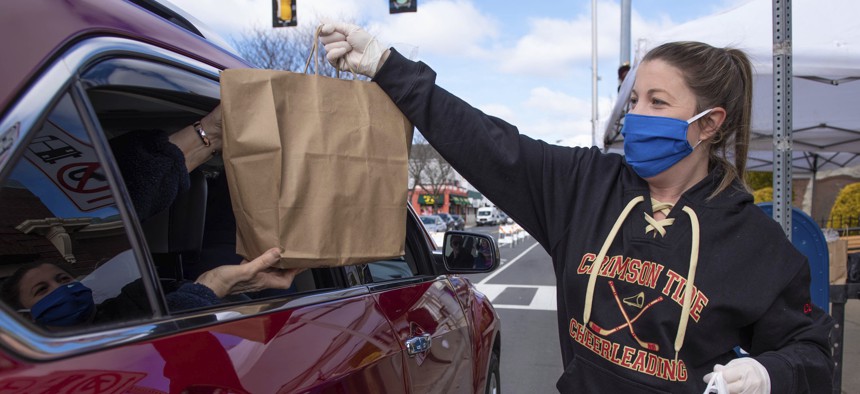Connecting state and local government leaders
Food banks are experiencing declines in donations, volunteers stuck at home, and skyrocketing need as people lose their jobs. In a couple states, governors and local governments are trying to help out.
More than 20 million people have filed for unemployment in the past month, bringing the U.S. unemployment rate to the highest number it’s been since the Great Depression. Many Americans already lived paycheck to paycheck before the coronavirus pandemic, but figuring out how to pay bills and provide for basic necessities is now an even greater challenge without a clear timeline for when things may return to normal. As a consequence, many people are turning to food banks for help—so many, in fact, that pantries can’t keep up.
Coronavirus has provided the perfect storm of circumstances to strain food pantries. As shoppers leave grocery store shelves empty, the excess food donations from supermarkets that many food banks rely on dried up. Volunteers who normally power daily operations are stuck at home under public health orders. At the same time, the number of people who are suddenly in need of immediate assistance has grown exponentially.
According to Feeding America, a national network of food relief organizations, 98% of pantries reported an increase in demand for food assistance at the beginning of April. At the same time, 59% said they have reduced inventory and 37% noted an “immediate critical funding shortfall.” Claire Babineaux-Fontenot, the CEO of Feeding America, said in a statement that food banks have never encountered such a dramatic set of circumstances at once. “The COVID-19 crisis is driving more of our neighbors into food insecurity and putting a strain on food banks to provide more meals,” she said. “Never has the charitable food system faced such tremendous challenge, and we need all the resources we can get to help our neighbors during this terrible time.”
Advocates are calling for increased funding during the local, state, and federal response to meet rising demands. In New York City, the epicenter of both the coronavirus and of job losses associated with it, Mayor Bill de Blasio allocated $25 million to food banks in the city last week, a pledge matched by the state government. The money came after food advocates declared a state of emergency at the end of March, warning that pantries were “on the verge of disaster” and that the collapse of the city’s food pantry system “could be only days away.”
New York isn’t alone. Food pantries across the country estimate they could run out of food within a few weeks, especially if demand keeps escalating. Lines outside food banks have already grown astronomically in the past few weeks. In San Antonio, 10,000 families appeared at a food bank that normally serves 200 to 400 families. A line for food assistance in Pittsburgh stretched for miles. A pop-up pantry in Maryland that was supposed to run for four hours was wiped out in 40 minutes. And when families are able to get food, the boxes in most places are lighter than usual, as pantries try to allocate what little they have in store equally amongst people who need it.
Even food pantries that have enough money to weather at least the initial surge of families needing assistance say they are struggling to keep up with demand—because even with the money to purchase greater quantities of food, there isn’t anywhere to spend it. Non-perishable staples like rice, beans, and grains have been wiped out by panic buying. Some have called on farms to donate the fresh produce and dairy they would otherwise dump as their restaurant customers suspend orders, but, logistically, that’s not as easy as it sounds. Federal regulations on milk, for example, require it to be processed before it leaves the farm, which costs money that farmers don’t have.
Governors have responded to shortages at food banks in several ways, trying to get them adequate staff, funding, and support. In California, Gov. Gavin Newsom dedicated 500 members of the state National Guard to assist food banks while the state’s stay-at-home order is in effect. “Food banks provide a critical lifeline for families and are needed now more than ever,” Newsom said.
In Oregon, Gov. Kate Brown on Monday dedicated $8 million to the Oregon Food Bank, a network of 21 pantries and 1,400 food assistance sites. Susannah Morgan, the CEO of the Oregon Food Bank, said in a statement that she was grateful to the governor and the state’s emergency coordination center for helping them through the crisis. “Our statewide network of regional food banks and partner agencies are moving mountains to meet the evolving needs of people throughout Oregon and southwest Washington,” she said. “But we know that there’s also an economic crisis looming ahead of us—and we can expect demand for food and resources to grow as the fallout worsens … We have to do all we can today to prepare for what is coming tomorrow.”
OTHER STORIES on Route Fifty:
Emma Coleman is the assistant editor for Route Fifty.

NEXT STORY: White House Plan to Reopen Economy Puts Onus on Governors




